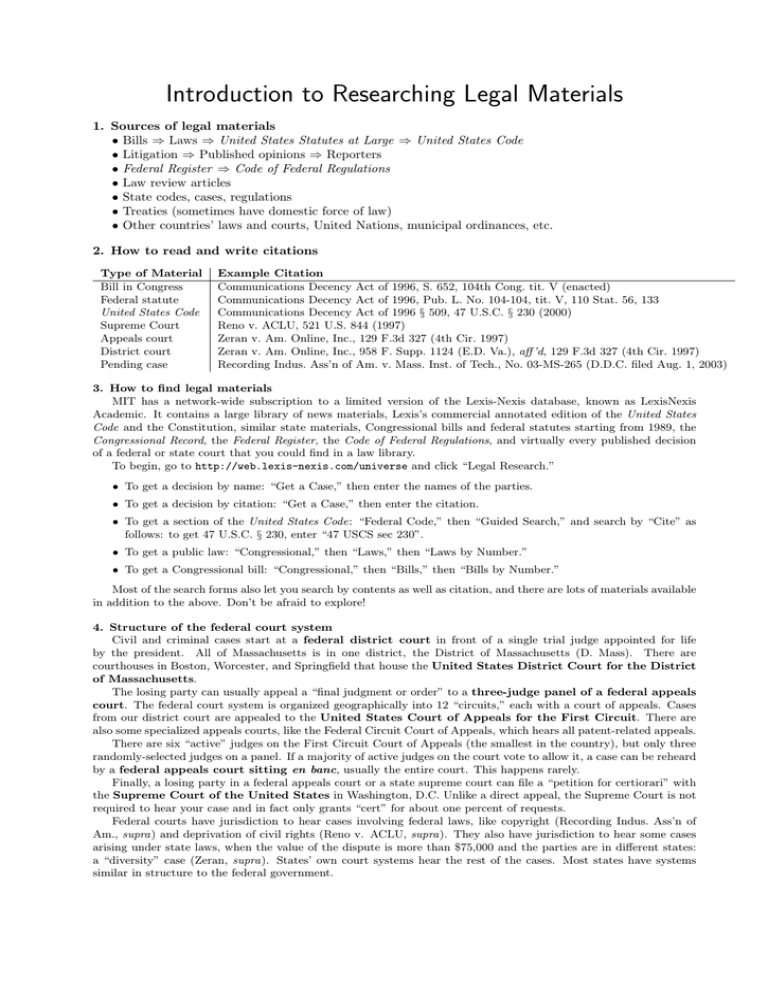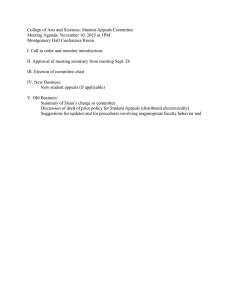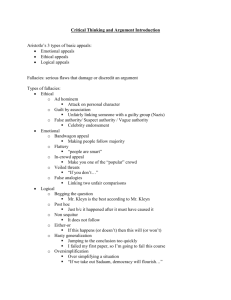Document 13546152
advertisement

Introduction to Researching Legal Materials 1. Sources of legal materials • Bills ⇒ Laws ⇒ United States Statutes at Large ⇒ United States Code • Litigation ⇒ Published opinions ⇒ Reporters • Federal Register ⇒ Code of Federal Regulations • Law review articles • State codes, cases, regulations • Treaties (sometimes have domestic force of law) • Other countries’ laws and courts, United Nations, municipal ordinances, etc. 2. How to read and write citations Type of Material Bill in Congress Federal statute United States Code Supreme Court Appeals court District court Pending case Example Citation Communications Decency Act of 1996, S. 652, 104th Cong. tit. V (enacted) Communications Decency Act of 1996, Pub. L. No. 104­104, tit. V, 110 Stat. 56, 133 Communications Decency Act of 1996 § 509, 47 U.S.C. § 230 (2000) Reno v. ACLU, 521 U.S. 844 (1997) Zeran v. Am. Online, Inc., 129 F.3d 327 (4th Cir. 1997) Zeran v. Am. Online, Inc., 958 F. Supp. 1124 (E.D. Va.), aff ’d, 129 F.3d 327 (4th Cir. 1997) Recording Indus. Ass’n of Am. v. Mass. Inst. of Tech., No. 03­MS­265 (D.D.C. filed Aug. 1, 2003) 3. How to find legal materials MIT has a network­wide subscription to a limited version of the Lexis­Nexis database, known as LexisNexis Academic. It contains a large library of news materials, Lexis’s commercial annotated edition of the United States Code and the Constitution, similar state materials, Congressional bills and federal statutes starting from 1989, the Congressional Record, the Federal Register, the Code of Federal Regulations, and virtually every published decision of a federal or state court that you could find in a law library. To begin, go to http://web.lexis­nexis.com/universe and click “Legal Research.” • To get a decision by name: “Get a Case,” then enter the names of the parties. • To get a decision by citation: “Get a Case,” then enter the citation. • To get a section of the United States Code: “Federal Code,” then “Guided Search,” and search by “Cite” as follows: to get 47 U.S.C. § 230, enter “47 USCS sec 230”. • To get a public law: “Congressional,” then “Laws,” then “Laws by Number.” • To get a Congressional bill: “Congressional,” then “Bills,” then “Bills by Number.” Most of the search forms also let you search by contents as well as citation, and there are lots of materials available in addition to the above. Don’t be afraid to explore! 4. Structure of the federal court system Civil and criminal cases start at a federal district court in front of a single trial judge appointed for life by the president. All of Massachusetts is in one district, the District of Massachusetts (D. Mass). There are courthouses in Boston, Worcester, and Springfield that house the United States District Court for the District of Massachusetts. The losing party can usually appeal a “final judgment or order” to a three­judge panel of a federal appeals court. The federal court system is organized geographically into 12 “circuits,” each with a court of appeals. Cases from our district court are appealed to the United States Court of Appeals for the First Circuit. There are also some specialized appeals courts, like the Federal Circuit Court of Appeals, which hears all patent­related appeals. There are six “active” judges on the First Circuit Court of Appeals (the smallest in the country), but only three randomly­selected judges on a panel. If a majority of active judges on the court vote to allow it, a case can be reheard by a federal appeals court sitting en banc, usually the entire court. This happens rarely. Finally, a losing party in a federal appeals court or a state supreme court can file a “petition for certiorari” with the Supreme Court of the United States in Washington, D.C. Unlike a direct appeal, the Supreme Court is not required to hear your case and in fact only grants “cert” for about one percent of requests. Federal courts have jurisdiction to hear cases involving federal laws, like copyright (Recording Indus. Ass’n of Am., supra) and deprivation of civil rights (Reno v. ACLU, supra). They also have jurisdiction to hear some cases arising under state laws, when the value of the dispute is more than $75,000 and the parties are in different states: a “diversity” case (Zeran, supra). States’ own court systems hear the rest of the cases. Most states have systems similar in structure to the federal government.



